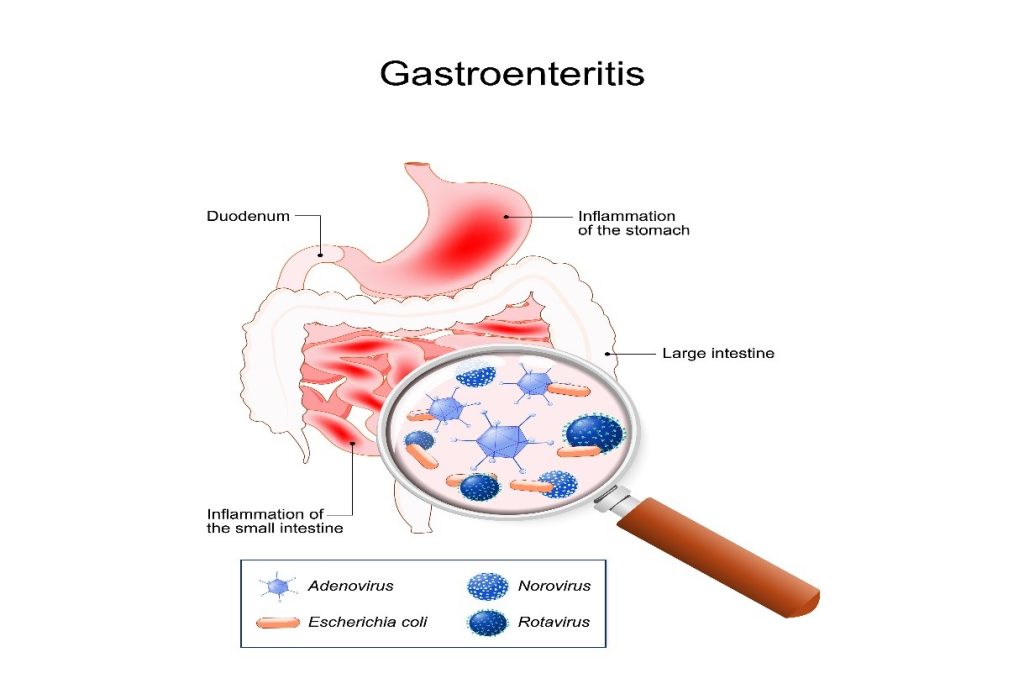A brief introduction to viral gastroenteritis
Viral gastroenteritis is a very contagious illness of the intestines that affects children and adults. It causes nausea, vomiting, and diarrhea. It is also called a stomach bug or stomach flu, although the virus mostly affects the intestines (not the stomach) and is not the same as the flu. Gastroenteritis causes inflammation and irritation in the small intestine, where nutrients mostly get absorbed into the bloodstream. Many different viruses can cause gastroenteritis. You may not know which specific virus you have. One can catch it by eating food that is contaminated by the virus, by touching contaminated surfaces, or by coming into contact with a sick person’s stool or vomit. The main symptoms of viral gastroenteritis are nausea, vomiting, and watery diarrhea. You may also have stomach cramps or a fever. In severe cases, the water losses from diarrhea and vomiting can cause dehydration, unless you manage to drink and keep down plenty of fluids. Signs of dehydration can include making less urine or really dark urine, and feeling dizzy or lightheaded. Symptoms are more severe for young children, elderly people, and anyone with a compromised immune system. Since viral gastroenteritis is caused by a virus, antibiotics will not get rid of it. The main goal is to prevent dehydration while you’re sick. Drink plenty of fluids to replace what is lost through vomiting and diarrhea. Try taking small sips of water every few minutes. If you are urinating more than usual, you are likely drinking enough fluids. If you choose to rehydrate with water, you should also increase your salt intake by eating salty snacks (like pretzels or crackers). You can also drink sports drinks (Gatorade) or an oral rehydration solution that contains electrolytes. Avoid alcohol and caffeine. And get extra rest until you feel better. If vomiting is so bad that you throw up every time you try to drink, head to the ER. For severe diarrhea with lightheadedness and when you’re unable to keep down liquids go to the ER. You may need fluids intravenously (IV). If you are vomiting or have diarrhea and you are elderly or have a weakened immune system, call the doctor for an urgent (within 24 hours) appointment. If your symptoms have not begun to improve in 3 days, you have a persistent high fever (above 102F), you have bloody diarrhea, or are pregnant, call your doctor for further advice.
Viral gastroenteritis causes
You get a stomach bug by eating or drinking food contaminated with the virus or by touching something that is contaminated by a virus and then touching your mouth. Some gastroenteritis viruses can survive for a long time (2 to 4 weeks) on hard surfaces (like sinks, counters, and doorknobs). Just a tiny amount of virus can make you sick.
Stomach viruses affect the intestines in different ways.
- Some infect the cells lining the intestine and then decrease the absorption of nutrients and water, causing diarrhea.
- Some cause the cells to dump water into the gut, also causing watery diarrhea.
- Some may cause the stomach to take longer to empty its contents into the small intestine, which may contribute to nausea and vomiting.
Certain people are more at risk of getting viral gastroenteritis including the elderly, children, those with a compromised immune system, or those with other diseases that affect the intestines, such as inflammatory bowel disease.

Viral gastroenteritis in children
Viral gastroenteritis is very common in infants and young children. In kids, it is usually caused by a virus called rotavirus, although other viruses including norovirus are becoming more widespread. In the U.S., a rotavirus vaccine is usually given to babies within their first 6 months. Vaccination greatly reduces the chances of getting a severe rotavirus infection. Children usually begin to recover from mild cases of gastroenteritis in 2 to 3 days, although they may have loose stools longer than other symptoms. They need to be watched closely to make sure they are drinking enough fluids. Good drinks are water, apple juice. If symptoms persist, or your child is showing signs of dehydration, has other serious medical conditions, or is less than two months old, call your doctor urgently for further instructions or evaluation.
How long are you contagious with viral gastroenteritis?
An infected person is usually contagious while they have symptoms and possibly for a short period before symptoms develop. But with some viruses, a person can be contagious for a few days (and up to two weeks or longer) after symptoms have stopped. Wash hands often with soap and water for at least 20 seconds to avoid spreading the virus to others. Hand sanitizer is not an effective substitute for killing some of these viruses. Do not prepare food for others while you are sick. If someone around you has viral gastroenteritis, the risk of catching it from them is

high. In addition, up to a third of people who are infected do not show symptoms but can still spread the virus. The virus can easily spread in places where there are a lot of people in close contact, such as cruise ships, nursing homes, and child care centers.
We in Rojan Azma provide a combo test for Adeno and Rota virus rapid test
Start writing or type / to choose a block
